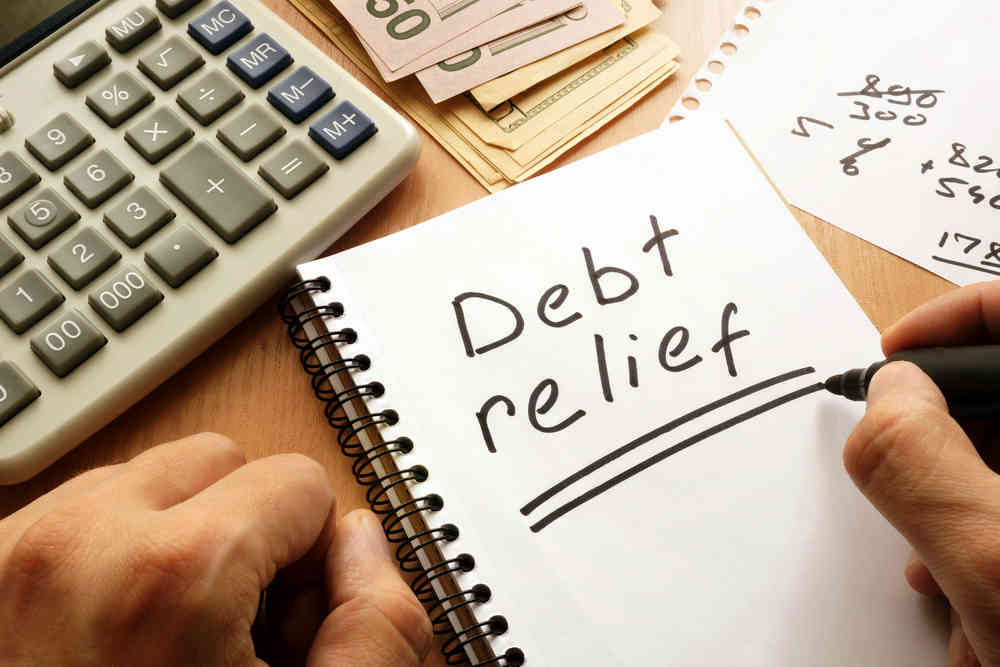There are ample ways available to solve debt problems, including:
1) the debt snowball method if you want to remain current on payments and improve your credit score (the #1 rated do-it-yourself debt relief solution)
2) debt settlement if you are behind on payments and need a monthly payment that is smaller than minimum payments on your own
3) debt consolidation if you have a high credit score and can comfortably afford to pay minimum payments or more
4) debt validation for credit cards in collection status, possibly resulting in you not having to pay the debt and getting it removed from credit reports
5) consumer credit counseling to reduce credit card interest rates, consolidating credit cards into one payment
6) bankruptcy, if none of the above debt-relief options work and you can’t afford any type of monthly payment or are on the urge of having your home foreclosed on
Owe above $10,000 in credit card debt? Debt Relief programs can reduce the amount you owe and in some cases, allow you to walk away from a debt without paying. No income, debt relief through bankruptcy may be a viable solution.
No matter what your financial situation looks like today, you can quickly turn things around. When it comes to debt relief solutions, they are developed to aid you in getting out of your debt quickly. The question is – what’s the right debt relief, settlement or consolidation plan for you? Is bankruptcy your only debt relief option? Let’s take a closer look!
Bankruptcy
The truth is, only file for bankruptcy if you can qualify for chapter 7 bankruptcy where your debt could get wiped away. Chapter 7 bankruptcy (liquidation) is a highly-preferred bankruptcy form that can erase debt and unsecured medical debt as well as personal loans. This process is performed within a few months.
Don’t let a bankruptcy lawyer recommend chapter 13 bankruptcy, as you have better options available. With chapter 13 bankruptcy you’ll get locked into a 5-year monthly payment plan that costs you as much or more than debt settlement. At least with debt settlement, you can become debt-free in 42 months or less and avoid having a bankruptcy on your credit report.
If you are on the urge of having your property foreclosed on, in that case, chapter 13 could save your home and be your best solution. To be eligible for chapter 7 bankruptcy, you will first need to meet with a non-profit credit counseling company.
Consumer Credit Counseling
Consumer credit counseling companies will try to reduce your interest rates and keep you out of bankruptcy. If you can’t afford consumer credit counseling, the credit counselor will provide you a certificate for bankruptcy. This certificate shows that you do qualify for bankruptcy and will help you become eligible for chapter 7. Make sure to speak with a certified and licensed consumer credit counseling company.
If you fail to become qualified for a chapter 7 bankruptcy, you can consider other options at that point.
Consolidation loans
Debt consolidation loans are only for individuals with a high credit score. If you apply for debt consolidation with bad credit, prepare for getting high-interest rates that could put you even deeper into debt.
With an excellent credit score, you can qualify for the lowest-interest loan, and you can use the funds from the loan to pay off your high-interest debt balances. You can even consolidate your debt with a low interest and payment home equity line of credit, or a balance transfer card in some cases.
Debt consolidation leaves just the loan amount to repay.
Debt Consolidation makes it easier to repay your debt because everything is consolidated into a single monthly payment.
One last tip to consider:
After paying off credit card bills with a consolidation loan, don’t close-out the accounts. Keep the accounts open so that your credit utilization ratio improves, and so will your credit score. The biggest mistake consumers make when using a consolidation loan to pay off debt, is that they close out the accounts after paying off each debt, hurting their credit scores.
Debt Settlement Vs. Debt Validation
Companies like Freedom Debt Relief and National Debt Relief offer debt settlement programs. These are two of the larger debt relief companies in the nation. However, what these companies fail to provide is a debt validation option. The truth is, debt validation programs can be less expensive than debt settlement and result in the debt coming off a person’s credit report entirely. Debt validation disputes the debt, resulting in it becoming legally uncollectible, where it no longer needs to get paid and cannot legally remain on credit reports.
Golden Financial Services recommends debt validation over debt settlement. Only if a debt is proven to be valid, then Golden Financial Services will recommend debt settlement but with a reputable attorney.
The reason GFS utilizes attorneys’ to settle debt is that creditors must direct all communication to the attorney, helping consumers get relief from debt collection harassment. Also, attorneys’ can file for a lawsuit against a credit card company if they violate a person’s consumer rights, under laws like the FDCPA and FCRA.
Debt settlement programs negotiate a payoff on unsecured debt, that can reduce the balance by up to 50%, before debt settlement company fees. In the end, consumers only end up paying about 70% of their debt when having it settled, including debt settlement attorney fees.
Important factors to consider
- Make sure the company is highly rated by the Better Business Bureau and has favorable online reviews
- Try to use the debt snowball or avalanche method (do it yourself options), before resulting to bankruptcy or a debt relief program
- Understand the benefits and downsides of each debt relief program before joining.
If you are looking for financial advice or assistance with credit card debt relief or debt consolidation, call Golden Financial Services today at (866)-376-9846 or info@goldenfs.org.
